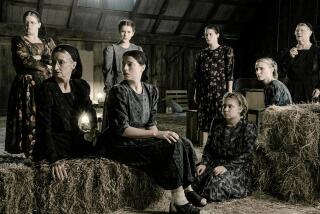Ignoring True Story Doomed ‘Windtalkers’
- Share via
Reviewing the box office return of “Windtalkers,” which has been characterized as “another disappointment for MGM” (“ ‘Scooby-Doo’ Fetches Biggest June Debut,” by Richard Natale, June 17), confirms that audiences are not as stupid as Hollywood thinks.
“Windtalkers” is an overblown, bloated excuse for a two-hour explosion. Though purportedly the story of the Navajo “code talkers,” in fact the real purpose of “Windtalkers” was clearly to create a vehicle for yet more white male stars. The fact that “Windtalkers” is a box office disappointment is no surprise, as it is a movie steeped in insincerity and butchering of the truth.
My father, Edward Valenzuela, was raised on the Papago Reservation in Tucson, Ariz., and was a decorated World War II veteran. Of Mexican and Native American descent, he epitomized patriotism and American values. He told me of the Navajo young men who went from the reservation to the front lines of the Pacific theater to provide communication assistance during World War II.
This story intrigued me, and I met with the head of the Navajo Code Talkers Assn., Sam Billison, in 1999 to pursue research and investigation for a screenplay on the code talkers. What was so striking from interviewing Billison and other code talkers was their ultimate patriotism for a country that had relegated them to a reservation yet relied on their expertise to prevail in World War II.
Billison’s story tells the richness of what makes America the country it is today--a combination of people from different ethnicities, different backgrounds and different religions, combining their energies to create a single great nation.
Upon completing my script--which centered on the lives of three teenagers who left the reservation, joined the code talkers and served in the military with as much patriotism and honor as any other soldier--I began shopping it around town. At the same time, a similar story was being promoted by producers, who had the interest of John Woo as a director, which became “Windtalkers.”
I learned about the “Windtalkers” project and spoke with one of its producers, explaining that I would be happy to share the research and interviews I had gathered while writing my script, with no request that I be given any credit. I said I would sign any release to ensure that I would never sue the producers or the studio for any type of copyright infringements.
The response I got was, essentially, that America wants to watch adult male stars, and since my movie would concern the issues surrounding three Native American youth, it would not attract a box office return.
Moreover, the producer advised me that their take on “Windtalkers” would concern the stress and turmoil surrounding the conflict the white soldiers would have when facing the prospect of having to shoot a code talker rather than allow him to be captured. In the end, the false take on the Navajo code talkers--focusing on the two white male leads and ignoring the essence of the true story--has shown itself in the box office flop the movie has become. The American audience, diverse in its thinking and its taste, will no longer accept such “Hollywood myths.”
The lesson for MGM, and any other studio that is looking to create positive box office return, is that “Windtalkers” is compelling evidence that promoting the white male as the focal point is not the way to tell every story.
*
Elizabeth R. Valenzuela is a Los Angeles-based attorney and screenwriter.
More to Read
Only good movies
Get the Indie Focus newsletter, Mark Olsen's weekly guide to the world of cinema.
You may occasionally receive promotional content from the Los Angeles Times.









